- Home
- Chuck Wendig
Aftermath: Star Wars Page 7
Aftermath: Star Wars Read online
Page 7
—
Jas prays the cable she fired from this tower to the roof far across the way will hold her. It’s long and the tower it’s moored to is weak. Even now she hears it groaning behind her.
Turns out, it doesn’t much matter.
The shuttle appears to her left out of nowhere. Another Lambda-class Imperial transport. Black window glass above the nose cone.
Implacable and uncaring.
The cannons begin to fire. Jas sucks in a breath and tightens her body up. She pulls herself close to the cable. Her muscles burn. She brings her legs up tight to her body, knees tucked into her stomach. All in an effort to make herself as small as possible as the blaster cannons spit lasers—
They sear the air in front of her. Behind her. Below and above. She knows she’s making a sound—a long, steady scream of rage and fear—but she can’t hear it. All she hears is the wind and the cannons.
Good news is, the blasters under each wing of that shuttle aren’t meant to hit relatively tiny targets like herself. Unless the person piloting that thing has Force sensibilities—a Jedi or some Dathomirian Nightsister—hitting her would be an act of pure cosmic providence.
Bad news is, whoever is operating those things just figured that out.
The shuttle turns just slightly—
And fires at the tower behind her.
A bright glow of flame behind her. The shriek of metal. And then it’s falling—she knows it’s falling because suddenly, the cable on which she’s traveling goes slack in her hands. From a rigid line to a loose noodle. She thinks: Hold on to it, hold tight, it’ll swing you down—
But the tumult is too much. The cable slips through her grip.
Wind whipping past. The city rushing up to greet her.
Jas Emari falls.
Norra comes back down into the basement. The secret door is still closed, the valachord still sitting there. She growls, more at herself than at anything. Now she has to do something she’s never been good at.
She has to remember how to play the valachord.
Well—she has to remember how to play a few notes on the valachord, because it’s not like she ever had 1 percent of the musical talent of her husband and child. She sits down, taps a few keys, each note a melodious tone tinged with a faint mechanical susurrus behind it. Tap, tap, tap. She’s not making music. She’s just making a mess.
But then—ahh. There. That’s the one. That’s the start of the “Cart and Cobble” shanty, isn’t it? The old miner song. Norra closes her eyes. Remembers her husband’s hands on the keys. The way the thumb and last finger splay out. The progression of notes, one-two-three-four-five—
She takes a deep breath and plays them.
The door pops open with the sound of air rushing.
Relief floods in and Norra steps up and through the doorway. Again that smell hits her—the smell of age, of dust, of mold. The smell of a dirt clod broken in your hand, or the smell of dry and crumbling moss.
The walls ahead look to be old stone. Myrra used to be Norra’s home, and she knows that underneath the city are the old catacombs—a city beneath a city, a maze from a much earlier time. Rumors about the maze abounded: a Jedi training temple, a Sith trap, the first dwelling of the primitive Uugteen, some slimy Hutt breeding ground. Stories about people getting lost down here, never found. Eaten by rancors. Falling forever down into the depths of bottomless pits. Stolen by the Uugteen and made into one of them, whatever they even are. Even ghost stories, as if the place is somehow haunted.
She knows the stories.
Norra hadn’t known the old catacombs connected right up to her damn house. Isn’t that something?
She takes one step and nearly screams.
Temmin is sitting right there, in a small alcove, his face highlit by the blue glow of a small holotab computer. On it, a map. He quickly turns it over and the screen goes dark. He sniffs. Wipes his eyes with the back of his hand then thrusts his chin up as if to cover up the fact he’s been crying.
Norra says, “I’m sorry.”
“Yeah. Me too.”
She holds out her hand and he takes it. Norra gives a little squeeze.
“I didn’t know this…was here.”
He looks up and around. “The catacombs? Yeah. I got hold of a map a couple of years back. The underground connects to a lot of the houses, especially here on Chenza Hill.”
“I spoke to your aunts.”
“Yeah?”
“They said you don’t even stay with them anymore.”
He clears his throat. “No. I stay here now. I’m independent.” He sighs. “You gonna see them while you’re here?”
“No,” she says.
“Figures.”
A spike of anger stabs her insides. Anger not at Temmin, but at the two aunts—her sister, Esmelle, and Esmelle’s wife, Shirene. It’s not their fault, she knows that, but she can’t help what she feels. They couldn’t handle Temmin and now here he is. Running this shop. Leading this life. Almost getting killed by…who? Local criminals. Thugs. Brutes.
“I spoke to them. They don’t want to leave Akiva. They’re settled here and I suppose I don’t blame them.”
Temmin stands up. An incredulous, sarcastic grin on his face. “Leave? What do you mean, leave?”
“Temmin.” Norra holds his hand tighter. “That’s why I’m here. I’m here to get you. We have to go.”
“Go? No way. This is my life. This is my shop. This is my home. You’re crazy if you think I’m gonna leave.”
“Listen to me. Something’s happening here. The Empire is down but they’re not out. The city is crawling now with stormtroopers. The Empire is here. They’ve instituted a blockade and a communications blackout.”
He narrows his eyes. He didn’t know about that, did he? Most of Myrra probably didn’t—though they’ll figure it out sooner than later. “Whatever. I’ve got an in with some Imperials. I sell them stuff. I’m not worried. You should go and save your…friend. Wedgie or whatever.”
“Wedge.”
“Sure.”
She says, “I’m not. I heard what you said, Temmin. I’m making a choice and you’re it. You’re the priority. I’m taking you away.”
“Nope. You’re not. I’m staying here. You can leave if you want, though. I’ll keep doing what I’ve done: survive fine without you.”
She bites her lip, trying not to say all the things that are threatening to come out. He was always headstrong and willful, but this is taking it to a whole other level. Temmin pushes past her, heading back toward the shop’s basement, back through the secret door.
“Temmin, wait—”
“I have to start loading this stuff into the catacombs. Hide it from Surat. It was nice to see you, Mom. You can go.”
She grabs his arm as he steps through the door. When he turns around, he sees what’s in her hand and his mouth forms an O of protest—
Norra sticks the needle, the half-broken one she stole from the interrogator droid, into his neck. She only needs to press the plunger part of the way—Temmin’s eyelids flutter like butterflies in a jar.
He passes out, and she catches him.
“I’m so sorry,” she says.
Then she starts dragging him back upstairs.
As Admiral Rae Sloane enters the room, they swarm her. This room is tall and broad and arched—in the center sits a massive table made from some old tree, the wood inlaid with tile of mirrored glass—but the way they come up on her makes her feel suddenly claustrophobic, as if this very big room is all an illusion, as if it’s far smaller than its dimensions would suggest. Rae lets it come. She doesn’t waver. Doesn’t show the pressure.
They’re all demanding to know what that was, but it’s Moff Pandion who speaks with the clearest demand. And when he speaks, the others quiet.
She makes a note of that. Unsurprising, perhaps, but still.
“What, pray tell, was that sound?” he asks, stepping forward. Meeting her almost nose-to-nose as he enter
s uncomfortably into her personal space.
“The blaster cannons, you mean.”
“No,” he says with a blistering eye roll, “I mean the squawking of birds, the barking of dogs, the tune you were whistling as you walked in.” He somehow smiles and scowls at the same time: “Yes, I mean the sound of the blaster cannons. What was that?”
“An insurgent,” she says.
“A rebel?” says the onetime adviser to Palpatine, Yupe Tashu, horror struck on his face like the gong of a bell. “Here?”
“No,” she lies. Likely not the last lie she’ll tell during this summit, either. “Not even that. Some local. As you well know—” She stops suddenly and says: “May we push back? Sit down? Enjoy the food Satrap Dirus has provided for us?” That suggestion, met with reluctant nods and grumbles. Rae moves with the crowd, giving small nods of greeting to the others: Jylia Shale, Arsin Crassus, the satrap, the satrap’s own cabal of bowing and scraping advisers.
Servers move around the room with shallow wooden bowls. They offer the bowls to those gathered so that the guests of the summit may pluck various foods—foods that Rae does not recognize. Little squirming things with black, inky tentacles. Small dumplings that smell of fragrant plum. Little seed-speckled balls that smell like the inside of her boots after she takes them off following a long day on her feet. Yupe Tashu picks at the food. Crassus eats greedily. Jylia has put a small plate of the food in front of her but seems hesitant to touch it. Pandion, predictably, has waved off food.
“As you know,” she continues, settling in at the head of the table—and standing, not sitting. “The rebels have begun to disseminate propaganda in the form of various holovids. In some cases they have literally stolen and subverted some of our probe droids and are using them to spread their lies.”
“Are they really lies?” Shale says. Just loud enough to be heard. “Or are we the ones lying to ourselves?”
A chill, after that. Pandion stares daggers at the old woman.
Rae ignores it and moves on: “We have been betrayed by various sector heads and governors across the galaxy. The so-called New Republic has led attacks on a number of our freighters and transports—successful attacks, I will add. Thus diminishing our numbers. We are, to be frank, on the defensive. An inopportune time to be scattered and leaderless. Hence the purpose of this meeting. I’d like to thank you all for—”
Pandion interrupts: “So, just now. We were attacked by a local insurgent? Not a…proper rebel?”
“No.” Rae bristles at the interruption, but it’s to be expected from him. “As noted, just a local. Likely one inspired by the aforementioned propaganda. Now, the summit begins tonight—”
“First, you’re late. Then you open fire outside the satrap’s palace. What of the rebel you took prisoner? Or of the smuggler’s ship that ran the blockade and escaped? Are we truly safe here, Admiral?”
A sinking, sour feeling pulls at Rae’s gut. Her stomach acid churns. If Pandion knows that, it means she has a leaky ship. A spy. Betrayal. Already the feeling that she’s lost control and they’re not even an hour into the meeting.
Yupe Tashu looks delighted. “We have a prisoner?”
“And you didn’t tell us?” Crassus says.
“This is quite concerning,” Shale says. “Quite concerning.”
Rae turns, looks toward her own squadron of stormtroopers, all of whom guard the door. To them and the pilot, she gives a small nod.
They disappear.
“The rebel was not part of any concerted attack,” she explains. “Just a lone rebel. Likely scouting for Imperial presence.”
“Well, he found it,” Pandion says, smirking.
With that, the door opens again and the stormtroopers usher in the hovering gurney. The medical droid accompanies the prisoner. Captain Antilles remains sedated. For now.
“That,” Sloane says, “is a danger to us, but also a fortune. For we have captured no small rebel here today. That is Captain Wedge Antilles, one of the heroes of the misguided Rebellion, present and instrumental in both of the Death Star attacks. Not only will Antilles be suitable to plumb for information, but should the rebels suss out this meeting, we can use him as a bargaining chip.”
Tashu raises a hand. “May I be involved in the…interrogation?”
She ignores him.
Pandion says: “Is this who we are now? Reduced to common hostage-takers? Perhaps the Galactic Empire truly is fading, like a star gone bright and then soon to dust. At least with the likes of you at the helm.” That last sentence a barb delivered right to Sloane.
“The summit begins tonight,” Sloane says. “So rest up if need be. Time is of the essence. The future of the Empire will be decided by us.” She looks to the archivist, a small, brittle man named Temmt. Februs Temmt. “Note in the official record that we will be referred to in history as the Imperial Future Council, or the IFC.” A sharp nod to those attended. “Thank you, and see the lot of you tonight.”
She moves quickly toward the door. Sloane fishhooks Adea, her new assistant, with the crook of her arm and pulls her close. She hisses: “Any sign of the bounty hunter?”
Panicked, Adea gives a small shake of her head. “No, Admiral.”
“Problems?” Pandion says, suddenly appearing by her side. That reptilian grin on his too-pale face.
“None,” Sloane says.
“Admiral, I admire what you’re doing here. I do. You are not wrong that now is the time to act. The Empire I love will not easily come back from the blow of losing not only the Death Star but also our leadership. But I want you to realize that the future of the Empire has never been decided by something so spineless and spiritless as a council. An Empire needs a leader. An Empire demands an emperor.”
“Then perhaps that is what the council will discover,” she says. Her eyes flit down to the rectangular bands across his breast. “I see you are elevated to grand moff. A self-proclaimed title, I’m guessing.”
That wicked grin. “If one wants power, one must take it.”
“True, perhaps.”
“Not perhaps. And you know it in your bones. I know that you have wrested control of not only the Vigilance, but of the Ravager, too. And likely the fleet that goes with it. Imagine that. Little Rae Sloane, manning an entire Super Star Destroyer all by herself. Our last, isn’t it?”
She says nothing. All she does is stare, stone-faced.
He goes on: “That was the fleet admiral’s ship, wasn’t it?”
“It was.”
“Was. So he’s truly gone?”
“Truly. And sadly. He was one of the best of us.”
“He was.” A trickster twinkle in Pandion’s eye. He’s got secrets. They all do. She just hasn’t figured his out yet. “I’ll see you at the meeting, Admiral. I am eager to get started.”
A small town in the mountains, reduced to rubble. A wind whips up, and dry leaves scrape the road between bodies. The corpses are everywhere. Two stormtroopers across the street. Two soldiers from the New Republic slumped up against a burning house, the roof still smoldering.
More down the lane, and more behind them.
Mon Mothma walks among the wreckage, attendants on each side of her: Hostis Ij to her left, and Auxi Kray Korbin on her right. Each serving the role of angel and demon on her shoulder (though the role is never fixed and one becomes the other depending on the situation). Behind them, four New Republic soldiers walking with blaster rifles at the ready.
This is the reality of war, Mon Mothma thinks. It has to be over soon. It must be. Ending this conflict was priority one. Naalol was strategically insignificant. Here, a series of little mountain towns with their little crooked mountain houses, and people who were valdeer shepherds or artisans or miners. But not far away was a small Imperial garrison, and when the Empire began to lose ground elsewhere, it tried to gain it on planets like Naalol—fallback positions. What was a small garrison became a large one, and then war came to these people. And now those people—or the people in t
his town, at least—are either dead or have found their lives in ruins.
It’s as if Hostis hears her thoughts. As she walks, he strokes his long beard and makes lots of hmms and ahhh sounds. Finally he speaks, unprovoked (as he often does): “This is the price of war. It is not the New Republic’s fault, Chancellor.”
“I’ve seen war,” Mon Mothma says. “I know its shape. I know its margins. But I’ll never be comfortable with it.” As some most certainly are, she thinks. She walks among some villagers who have gathered along the length of a low rock wall. Two Republic soldiers ladle hot broth out of a pot and into cups for them. As she walks, Mon Mothma takes hands and shakes them, pressing a few credits into palms as she does and saying a few small words of apology and gratitude. As they pass she says: “It is our fault and we must act that way to uphold our responsibilities. And it’s why the war must stop soon. We cannot keep fighting it. We are not equipped to.”
Hostis blusters and says: “That’s hardly true. We’re more equipped than ever, Chancellor. The Empire is waning and the whole galaxy can sense it. We can barely contain the lineup of recruits willing to fight for us now that the conflict is more out in the open. We have more ships. More equipment. More weapons. The tide has turned and—”
“I don’t mean equipped in the literal sense, Hostis. I mean that this is not our heart. War is not a state of being. It is meant to be a temporary chaos between periods of peace. Some want it to be the course of things: a default fact of existence. But I will not let that be so.”
Here, Auxi leans in and the Togruta woman whispers: “Chancellor, just to be mindful: We will have to leave soon if we are to be home on Chandrila in time for the Senate’s first official day back.”
“Yes. Of course.”
She stands in the middle of it all. The rubble. The bodies. In the distance: a wrecked Imperial AT-AT walker, slumped forward like an animal with its neck broken. Not far from it: the cross-foils from an X-wing fighter broken and burning on a mountain ledge. One street over, a lineup of Imperials bound in a cascading series of shackles, each connected to the other by a buzzing thread of electricity. The prisoners are marched forward toward a transport by New Republic troops.

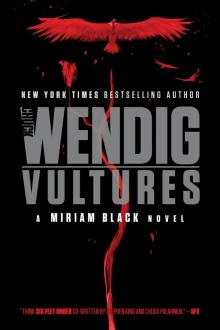 Vultures
Vultures Mockingbird
Mockingbird Wanderers
Wanderers The Cormorant
The Cormorant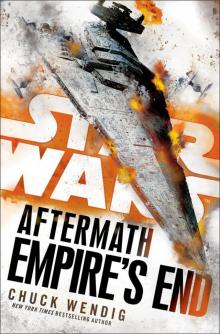 Empire's End: Aftermath (Star Wars)
Empire's End: Aftermath (Star Wars)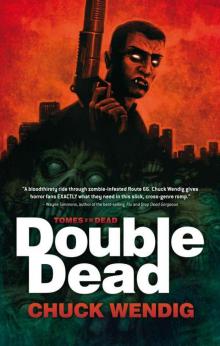 Double Dead
Double Dead The Blue Blazes
The Blue Blazes 250 Things You Should Know About Writing
250 Things You Should Know About Writing Irregular Creatures
Irregular Creatures The Raptor & the Wren
The Raptor & the Wren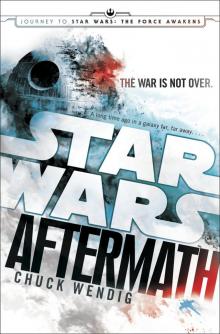 Aftermath: Star Wars
Aftermath: Star Wars Blackbirds
Blackbirds The Hunt
The Hunt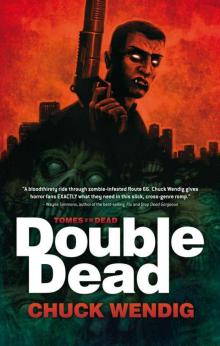 Tomes of the Dead (Book 1): Double Dead
Tomes of the Dead (Book 1): Double Dead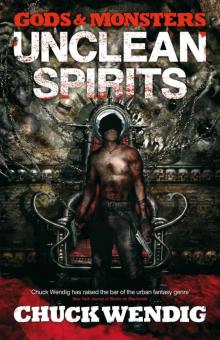 Gods and Monsters: Unclean Spirits
Gods and Monsters: Unclean Spirits The Harvest
The Harvest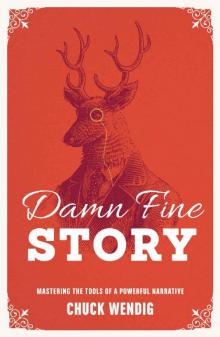 Damn Fine Story: Mastering the Tools of a Powerful Narrative
Damn Fine Story: Mastering the Tools of a Powerful Narrative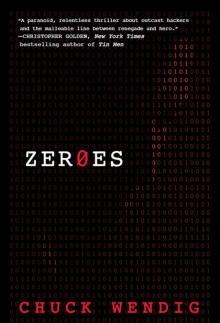 ZerOes
ZerOes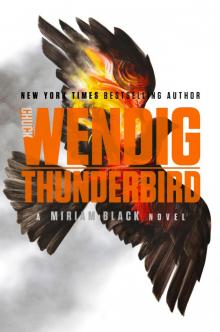 Thunderbird
Thunderbird The Hellsblood Bride
The Hellsblood Bride Double Dead: Bad Blood
Double Dead: Bad Blood Life Debt
Life Debt